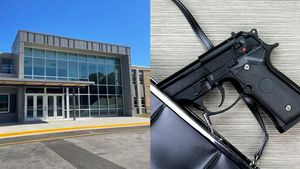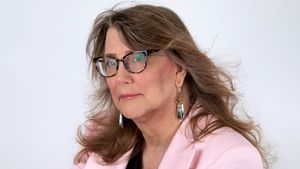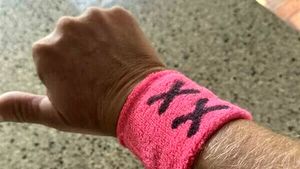In her first appearance on NBC's competition show American Ninja Warrior, 20-year-old Casey Rothschild became the youngest woman at the time to scale the notorious "Warped Wall" and complete a course. Now, she's a 5-time veteran of the series and a 2-time national finalist. She is also openly bisexual, and carries a Pride flag with her when she takes the ANW stage.
In 2020, Casey founded Queer Ninjas Unite, a group that gives LGBTQ+ ninjas from across the country a safe space to connect. This year, she's returning to American Ninja Warrior to compete in its 15th season, which premiered this June.
Below, we talk with Casey about why she got into the sport, being visible for her community, the impact of Queer Ninjas Unite, and more.
Out: What is your earliest American Ninja Warrior memory, and when did you know you wanted to compete?
Casey Rothschild: My first encounter with American Ninja Warrior was in 2014 when I saw Kacy Catanzaro become the first woman to complete a semi-finals course. I was always inspired by the strong women who I saw compete on the show but, at the time, there were very few gyms to train Ninja Warrior at. Three years later, I was in my off season from Track and Field at Wesleyan University and was looking for a new activity. With my background as a circus artist and pole vaulter, ninja felt like it might be a good fit - and it was! I visited the Windsor Ninja Academy in Connecticut and immediately fell in love with the sport and community. I was a bit hesitant to jump into competing but, with encouragement from my coaches, I tried a few local competitions and soon became more connected with the ninja community around New England. That year, Ninja dropped the age limit down from 21 to 19 (my age at the time) so I knew I had to apply and give it a try - I did not think I would get on that year but ended up getting “the call."
Taking on the American Ninja Warrior course for the first time felt like a dream - literally, it is quite surreal competing on that course with the lights and the amazing energy of the crowd and my fellow competitors. That year I became the youngest woman to hit a buzzer and remember being at the base of the wall and taking in that that was the wall I had seen so many women who inspired me take on in years before. It was quite a night!

You're a 5-time ANW veteran and a 2-time national finalist. How have you changed as a competitor from your first appearance to now?
My perspective on competing has changed a ton since I first went on the show. When I began, I was a college athlete who in many ways was trying to prove myself on the course. I think I felt a lot of pressure to match my initial performance and had to work hard to overcome the anxiety I had surrounding competition. Now, representing Queer Ninjas Unite has made feeling calm on the course even easier. I did not know of any out queer athletes on the show when I was just a fan and I know it would have meant the world to me to see someone like me step on the course. These days, walking up onto that stage holding the pride flag for my community, that is enough. Completing obstacles or hitting a buzzer is just a bonus.
What led you to form Queer Ninjas Unite?
I founded Queer Ninjas Unite in 2020 in response to the seeming lack of out queer ninjas in the community. As a bisexual athlete, I only knew of a few ninjas who identified as LGBT+. The group was originally founded as a Facebook Group - mirroring a similarly named circus group I had joined years back. Queer Ninjas Unite quickly grew from 5-6 ninjas (the only queer ninjas my friends and I knew at the time) to dozens of athletes across the country - some of whom joined before formally coming out.
I had been posting quite a bit of LGBT+ content on my personal page that June and thought to create a dedicated Queer Ninjas Unite Instagram account that would be open to queer folx as well as allies. And thus began the page, @queerninjasunite - a page dedicated to promoting equality for LGBT+ ninja athletes and educating our community at large.
What has the group's impact been?
In 2021, American Ninja Warrior aired a segment on our group which was one of (if not the) first queer features on the show. I am happy to say we have since had more! A few key initiatives we have led include the pairing of queer youth with queer adults as part of the Neighborhood Ninjas mentorship program and the creation of All Gender divisions across the US in response to advocacy for more inclusive gender categories for nonbinary athletes - which we hope will further expand next season! Beyond more specific initiatives, we have been able to create a safe space for queer ninjas to connect, some of whom are not ready to publicly come out yet.
Since the founding of our group, queer ninjas like myself will no longer have to question if they are alone in our community.
 Queer Ninjas Unite at Newport Pride
Queer Ninjas Unite at Newport Pride
Can you share more about the Neighborhood Ninjas mentorship program?
Of course! Neighborhood Ninjas is a Ninja Warrior nonprofit that I have worked with since 2018 that works to expand access and diversity in the sport of Ninja Warrior - which spans far beyond the show itself. We began a formal mentorship program in recent years that pairs adult ninja mentors with ninja youth. The pairings work together throughout the year to use the lessons we can learn from ninja to help the mentees set and reach goals both on and off the course. For our queer pairings, it was especially significant to have a mentor who could understand their experience in the queer community. The year of our first round of the mentorship program, the program had already begun when Queer Ninjas Unite was informed a trans girl was experiencing bullying in the ninja community, we were able to facilitate an “emergency pairing” with one of our existing queer mentors. In an interview I did with her, the mentee had explained of her experience coming out in Ninja, “My experience has been pretty neutral because I did lose a lot of ninja friends but also had good experiences like when QNU [Queer Ninjas Unite] was created because it gives me a sense of community that's smaller than the whole entire community of ninjas.”
What has it been like competing in ANW as an LGBTQ+ ninja?
I have had really positive experiences competing as an LGBTQ+ ninja, but as a white femme presenting cis woman, my experience is not necessarily reflective of our community as a whole. The show has been incredibly supportive of Queer Ninjas Unite and we have had a number of QNU athletes compete - including several trans and nonbinary athletes. I always say that while most ninjas are incredibly accepting and supportive, our sport includes people of all walks of life and, much like our country, is not universal in its support of queer athletes. This is particularly the case for transgender and nonbinary athletes.
Are there any changes that need to be made so that queer ninjas can feel welcome?
Absolutely! I am so proud of how responsive the community has been already but there is more progress needed to create an inclusive environment. Last year, I was informed that a young nonbinary athlete was deeply struggling as they wished to compete in local competitions but did not want to have to choose the male or female divisions. I decided the best thing to do was to make a call to action. I was able to use the power of the Queer Ninjas Unite platform to urge gyms and leagues to create more inclusive gender divisions - and thus “All Gender” divisions were born. One league in particular, the New England Ninjas Association, went above and beyond in establishing these divisions across age groups. I interviewed quite a number of nonbinary ninjas to get their opinions and “All Gender” was the desired label as to keep the additional category fully inclusive and to allow closeted nonbinary athletes to compete without being forced to come out. Myself and several other cis athletes competed “All Gender” this season alongside nonbinary athletes who had expressed that without this division, they would not feel comfortable competing.
For trans athletes, it is a mixed bag. American Ninja Warrior and several major leagues allow trans athletes to compete as they identify but there are leagues we know of that, unfortunately, do not. All athletes deserve the opportunity to compete as their authentic selves and we will continue to advocate for all those who cannot.

You're once again competing on ANW. In the face of ongoing legislative attacks on LGTBQ+ Americans, what message do you hope to send by representing Queer Ninjas Unite on national television?
Between bans on drag and severe restrictions on education and lifesaving gender-affirming healthcare, our community is under attack. This is not new. I hope that Queer Ninjas Unite can provide representation and hope to viewers at home who can see themselves in us. The fight for equality spans far beyond this sport but we hope that by showing up as ourselves we can send a strong message - we are not going anywhere.
What do you like to spend time doing outside of ANW training?
Outside of Ninja, I work as a project manager in tech and spend my free time watching films, rock climbing with friends, going to concerts, and traveling. I recently joined a queer climbing club and have loved connecting with queer folx in the climbing community as well!
Watch Casey and other Ninjas compete in Season 15 of American Ninja Warrior, airing Mondays at 8 p.m. ET/PT on NBC.
You can also follow Casey on Instagram here and check out her debut qualifying run from American Ninja Warrior season 10 below.
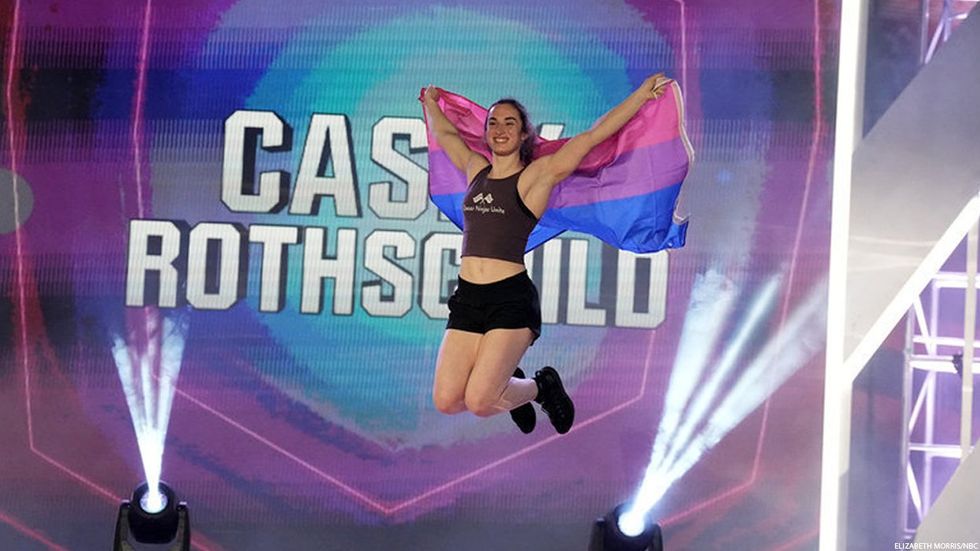





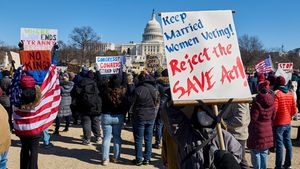




















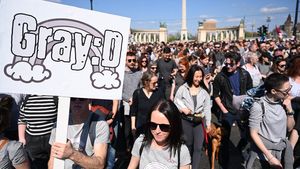







 Queer Ninjas Unite at Newport Pride
Queer Ninjas Unite at Newport Pride

